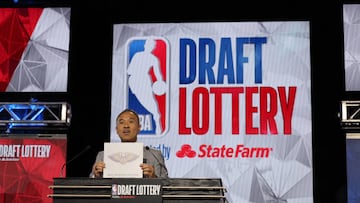Can a rookie refuse to play for the NBA team that drafted him?
The complicated world of the NBA Draft and the Draft Rights that follow can be hard to understand, even more so when a player says no to the team drafting him.

Though you wouldn’t think so, drafted players in the NBA can actually refuse to play for the team that drafted them. What’s more is its happened before.
How do NBA Draft rights work?
Before we can answer the question, ‘can a draft pick refuse to play for the team that drafted him?’, it’s important to understand exactly how Draft Rights work when it comes to teams picking and negotiating with their newly selected players. In essence Draft Rights give a team exclusivity when it comes to negotiation with and the signing of their Draft Pick. As per the norm, a team will usually hold a player’s Draft Rights for the period of one year - this time period only applies to non-Early Entry players. This is done specifically to avoid Draft Picks from acting as free agents and signing with any team of they like.
As for when they go into effect, Draft Rights activate the moment a player is drafted to a team, however, they are only maintained for are only maintained for the full year if the drafting team makes a Required Tender (contractual offer) to their draft pick. The details of said tender hinge on whether the player in question is a first or second round pick. If he’s a first round pick, the Required Tender follows the rookie scale requirements and grants the player a signing window that extends up to the first day of the season. Where second round picks are concerned, there are stipulations on the Required Tender i.e. the drafting team must offer at least the league’s minimum salary, while giving a signing window that ends on October 15th. It’s important to note here that should a player decide he doesn’t want to play for the team that drafted him, he can’t simply go and sign for another team. Remember, his Draft Rights are maintained for a year by the team that drafted him, meaning the most he can do is sit and wait.
NBA Draft Rights can be traded
Interestingly, a player’s Draft Rights can actually be traded by teams. Though they don’t have any monetary value per say, one can imagine that depending on the player and the situation, a team can stand to gain salary cap space with the arrival or departure of a drafter player. In case you’re wondering, the same rules still apply to the player’s Draft Rights even if he moves from one team to another. That’s to say that the player enjoys all of the same rights he would have had with the team that drafted him.
Has any player refused to play for the NBA team that drafted him?
Though you might think not given the allure of the lucrative contracts on offer in the NBA, we’ve actually seen a scenario before where a player who was drafted refused to turn out for the team that selected him. It was back in 1989 when the notoriously terrible - at the time - Los Angeles Clippers drafted Danny Ferry out of Duke University as the 2nd pick overall in that year’s draft. A highly coveted player as early as high school, Ferry infamously refused to play with the Clippers.
Having led the Blue Devils to the Final Four on three different occasions as well as picking up a couple of Player of the Year awards, one can imagine that the rookie’s choice was the talk of the town at the time. Ferry would go on to make his way to Europe where he played in the Italian League with Il Messaggero (now Virtus Roma). After that one season Ferry would make his way back to the NBA where he would spend the majority of his career with the Cleveland Cavaliers, before finally moving to the San Antonio Spurs with whom he actually won a championship in the 2002-2003 season.







